The Impact of Ginkgo Biloba on Cognitive Function and Ageing
VerifiedAdded on 2022/09/18
|9
|2506
|29
Literature Review
AI Summary
This literature review examines the effects of Ginkgo biloba on cognitive function and memory loss in the context of ageing. The review analyzes several key studies, including meta-analyses and clinical trials, to assess the efficacy of Ginkgo biloba extracts, particularly EGb 761, in treating mild cognitive impairment and dementia. The studies explored dosages, combinations with other herbal supplements, and long-term effects. While some studies found significant symptomatic improvement and cognitive enhancement, others showed no statistically significant results, highlighting areas of agreement and disagreement within the research. The review also discusses the strengths and limitations of the articles, including sample sizes, duration of studies, and participant demographics. The findings suggest potential benefits of Ginkgo biloba in managing cognitive decline associated with ageing, with recommendations for its use in improving memory and overall cognitive health. The review concludes by emphasizing the need for further research to validate the long-term efficacy and optimal dosages of Ginkgo biloba for cognitive enhancement.
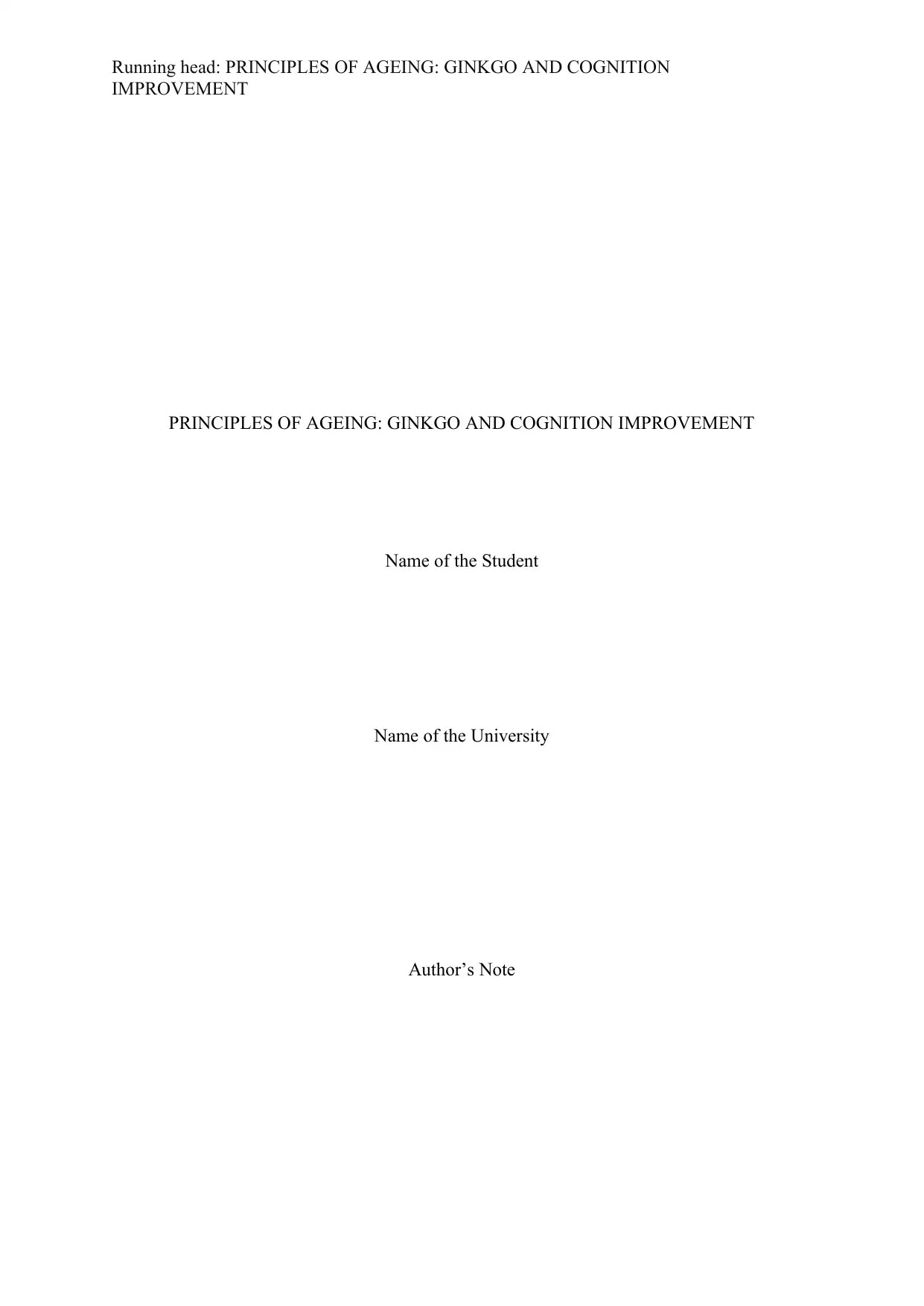
Running head: PRINCIPLES OF AGEING: GINKGO AND COGNITION
IMPROVEMENT
PRINCIPLES OF AGEING: GINKGO AND COGNITION IMPROVEMENT
Name of the Student
Name of the University
Author’s Note
IMPROVEMENT
PRINCIPLES OF AGEING: GINKGO AND COGNITION IMPROVEMENT
Name of the Student
Name of the University
Author’s Note
Paraphrase This Document
Need a fresh take? Get an instant paraphrase of this document with our AI Paraphraser
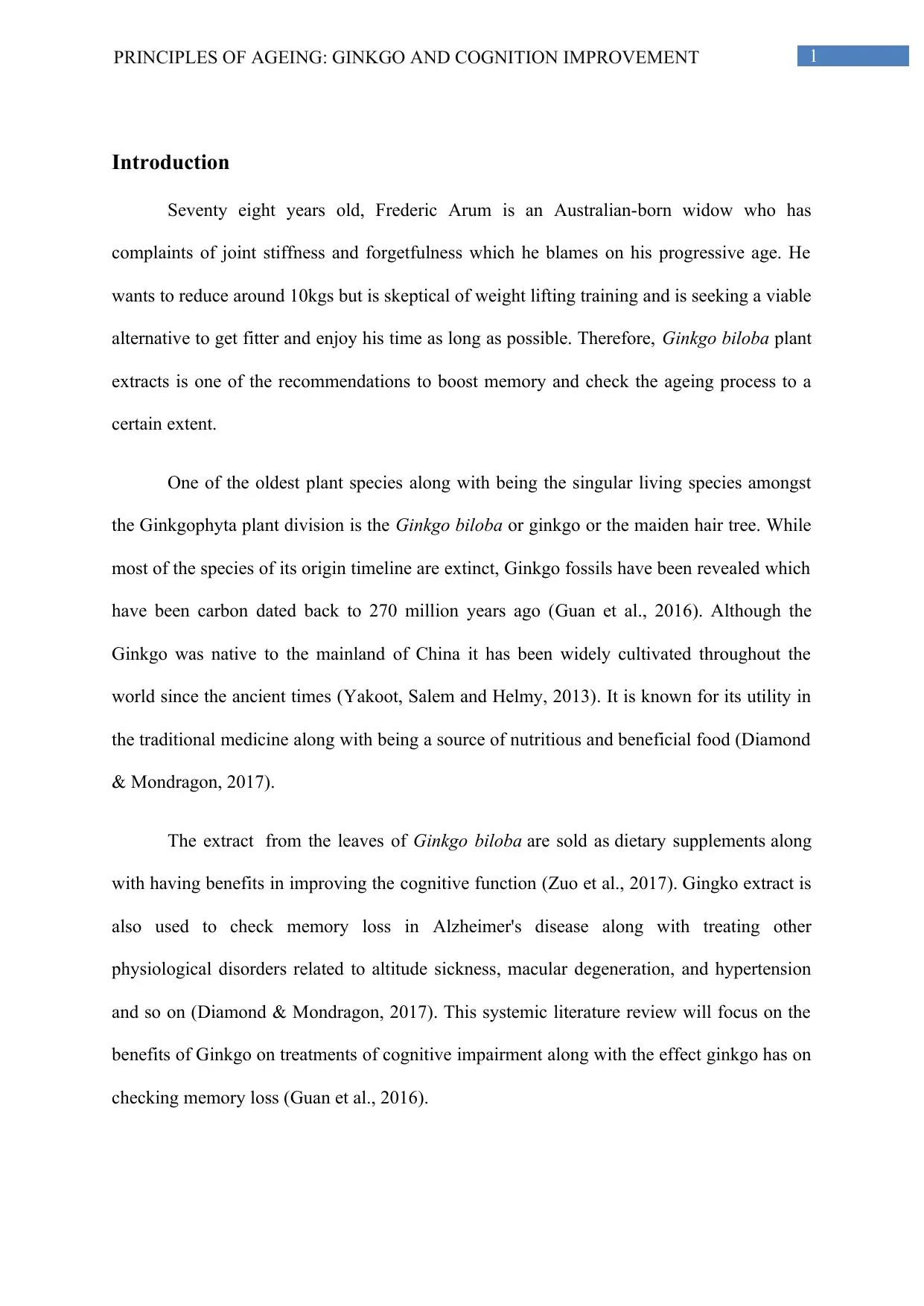
1PRINCIPLES OF AGEING: GINKGO AND COGNITION IMPROVEMENT
Introduction
Seventy eight years old, Frederic Arum is an Australian-born widow who has
complaints of joint stiffness and forgetfulness which he blames on his progressive age. He
wants to reduce around 10kgs but is skeptical of weight lifting training and is seeking a viable
alternative to get fitter and enjoy his time as long as possible. Therefore, Ginkgo biloba plant
extracts is one of the recommendations to boost memory and check the ageing process to a
certain extent.
One of the oldest plant species along with being the singular living species amongst
the Ginkgophyta plant division is the Ginkgo biloba or ginkgo or the maiden hair tree. While
most of the species of its origin timeline are extinct, Ginkgo fossils have been revealed which
have been carbon dated back to 270 million years ago (Guan et al., 2016). Although the
Ginkgo was native to the mainland of China it has been widely cultivated throughout the
world since the ancient times (Yakoot, Salem and Helmy, 2013). It is known for its utility in
the traditional medicine along with being a source of nutritious and beneficial food (Diamond
& Mondragon, 2017).
The extract from the leaves of Ginkgo biloba are sold as dietary supplements along
with having benefits in improving the cognitive function (Zuo et al., 2017). Gingko extract is
also used to check memory loss in Alzheimer's disease along with treating other
physiological disorders related to altitude sickness, macular degeneration, and hypertension
and so on (Diamond & Mondragon, 2017). This systemic literature review will focus on the
benefits of Ginkgo on treatments of cognitive impairment along with the effect ginkgo has on
checking memory loss (Guan et al., 2016).
Introduction
Seventy eight years old, Frederic Arum is an Australian-born widow who has
complaints of joint stiffness and forgetfulness which he blames on his progressive age. He
wants to reduce around 10kgs but is skeptical of weight lifting training and is seeking a viable
alternative to get fitter and enjoy his time as long as possible. Therefore, Ginkgo biloba plant
extracts is one of the recommendations to boost memory and check the ageing process to a
certain extent.
One of the oldest plant species along with being the singular living species amongst
the Ginkgophyta plant division is the Ginkgo biloba or ginkgo or the maiden hair tree. While
most of the species of its origin timeline are extinct, Ginkgo fossils have been revealed which
have been carbon dated back to 270 million years ago (Guan et al., 2016). Although the
Ginkgo was native to the mainland of China it has been widely cultivated throughout the
world since the ancient times (Yakoot, Salem and Helmy, 2013). It is known for its utility in
the traditional medicine along with being a source of nutritious and beneficial food (Diamond
& Mondragon, 2017).
The extract from the leaves of Ginkgo biloba are sold as dietary supplements along
with having benefits in improving the cognitive function (Zuo et al., 2017). Gingko extract is
also used to check memory loss in Alzheimer's disease along with treating other
physiological disorders related to altitude sickness, macular degeneration, and hypertension
and so on (Diamond & Mondragon, 2017). This systemic literature review will focus on the
benefits of Ginkgo on treatments of cognitive impairment along with the effect ginkgo has on
checking memory loss (Guan et al., 2016).
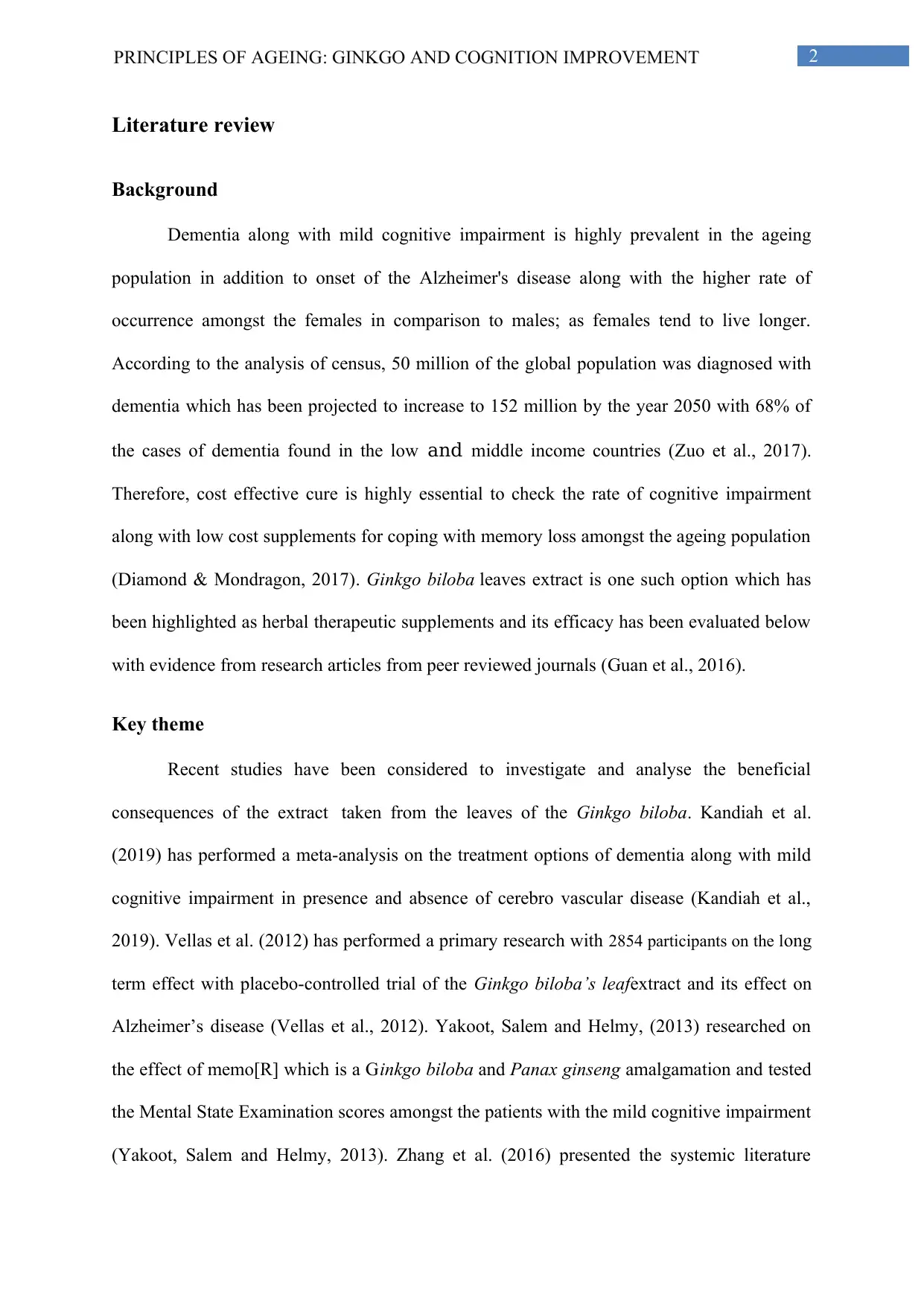
2PRINCIPLES OF AGEING: GINKGO AND COGNITION IMPROVEMENT
Literature review
Background
Dementia along with mild cognitive impairment is highly prevalent in the ageing
population in addition to onset of the Alzheimer's disease along with the higher rate of
occurrence amongst the females in comparison to males; as females tend to live longer.
According to the analysis of census, 50 million of the global population was diagnosed with
dementia which has been projected to increase to 152 million by the year 2050 with 68% of
the cases of dementia found in the low and middle income countries (Zuo et al., 2017).
Therefore, cost effective cure is highly essential to check the rate of cognitive impairment
along with low cost supplements for coping with memory loss amongst the ageing population
(Diamond & Mondragon, 2017). Ginkgo biloba leaves extract is one such option which has
been highlighted as herbal therapeutic supplements and its efficacy has been evaluated below
with evidence from research articles from peer reviewed journals (Guan et al., 2016).
Key theme
Recent studies have been considered to investigate and analyse the beneficial
consequences of the extract taken from the leaves of the Ginkgo biloba. Kandiah et al.
(2019) has performed a meta-analysis on the treatment options of dementia along with mild
cognitive impairment in presence and absence of cerebro vascular disease (Kandiah et al.,
2019). Vellas et al. (2012) has performed a primary research with 2854 participants on the long
term effect with placebo-controlled trial of the Ginkgo biloba’s leafextract and its effect on
Alzheimer’s disease (Vellas et al., 2012). Yakoot, Salem and Helmy, (2013) researched on
the effect of memo[R] which is a Ginkgo biloba and Panax ginseng amalgamation and tested
the Mental State Examination scores amongst the patients with the mild cognitive impairment
(Yakoot, Salem and Helmy, 2013). Zhang et al. (2016) presented the systemic literature
Literature review
Background
Dementia along with mild cognitive impairment is highly prevalent in the ageing
population in addition to onset of the Alzheimer's disease along with the higher rate of
occurrence amongst the females in comparison to males; as females tend to live longer.
According to the analysis of census, 50 million of the global population was diagnosed with
dementia which has been projected to increase to 152 million by the year 2050 with 68% of
the cases of dementia found in the low and middle income countries (Zuo et al., 2017).
Therefore, cost effective cure is highly essential to check the rate of cognitive impairment
along with low cost supplements for coping with memory loss amongst the ageing population
(Diamond & Mondragon, 2017). Ginkgo biloba leaves extract is one such option which has
been highlighted as herbal therapeutic supplements and its efficacy has been evaluated below
with evidence from research articles from peer reviewed journals (Guan et al., 2016).
Key theme
Recent studies have been considered to investigate and analyse the beneficial
consequences of the extract taken from the leaves of the Ginkgo biloba. Kandiah et al.
(2019) has performed a meta-analysis on the treatment options of dementia along with mild
cognitive impairment in presence and absence of cerebro vascular disease (Kandiah et al.,
2019). Vellas et al. (2012) has performed a primary research with 2854 participants on the long
term effect with placebo-controlled trial of the Ginkgo biloba’s leafextract and its effect on
Alzheimer’s disease (Vellas et al., 2012). Yakoot, Salem and Helmy, (2013) researched on
the effect of memo[R] which is a Ginkgo biloba and Panax ginseng amalgamation and tested
the Mental State Examination scores amongst the patients with the mild cognitive impairment
(Yakoot, Salem and Helmy, 2013). Zhang et al. (2016) presented the systemic literature
⊘ This is a preview!⊘
Do you want full access?
Subscribe today to unlock all pages.

Trusted by 1+ million students worldwide
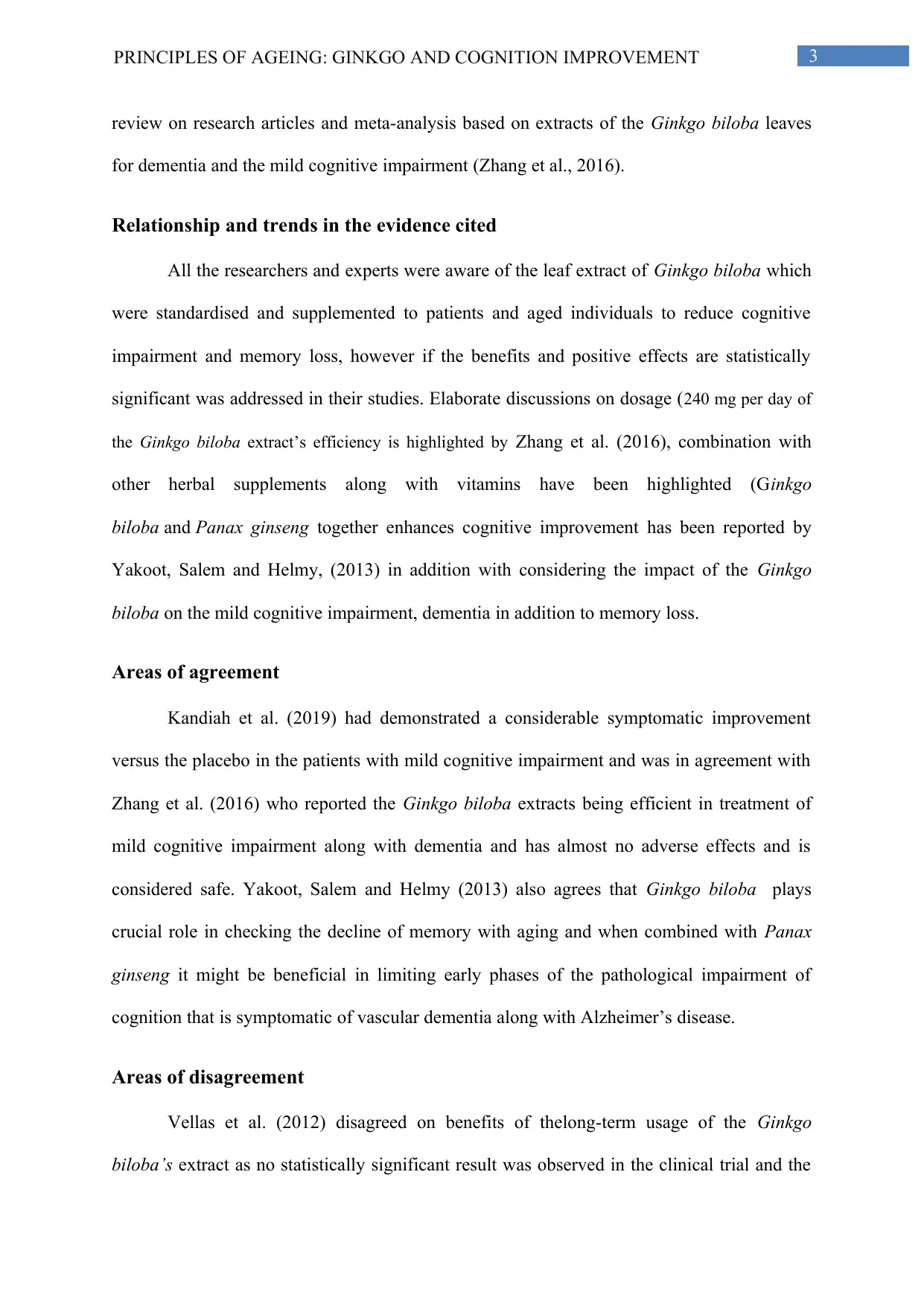
3PRINCIPLES OF AGEING: GINKGO AND COGNITION IMPROVEMENT
review on research articles and meta-analysis based on extracts of the Ginkgo biloba leaves
for dementia and the mild cognitive impairment (Zhang et al., 2016).
Relationship and trends in the evidence cited
All the researchers and experts were aware of the leaf extract of Ginkgo biloba which
were standardised and supplemented to patients and aged individuals to reduce cognitive
impairment and memory loss, however if the benefits and positive effects are statistically
significant was addressed in their studies. Elaborate discussions on dosage (240 mg per day of
the Ginkgo biloba extract’s efficiency is highlighted by Zhang et al. (2016), combination with
other herbal supplements along with vitamins have been highlighted (Ginkgo
biloba and Panax ginseng together enhances cognitive improvement has been reported by
Yakoot, Salem and Helmy, (2013) in addition with considering the impact of the Ginkgo
biloba on the mild cognitive impairment, dementia in addition to memory loss.
Areas of agreement
Kandiah et al. (2019) had demonstrated a considerable symptomatic improvement
versus the placebo in the patients with mild cognitive impairment and was in agreement with
Zhang et al. (2016) who reported the Ginkgo biloba extracts being efficient in treatment of
mild cognitive impairment along with dementia and has almost no adverse effects and is
considered safe. Yakoot, Salem and Helmy (2013) also agrees that Ginkgo biloba plays
crucial role in checking the decline of memory with aging and when combined with Panax
ginseng it might be beneficial in limiting early phases of the pathological impairment of
cognition that is symptomatic of vascular dementia along with Alzheimer’s disease.
Areas of disagreement
Vellas et al. (2012) disagreed on benefits of thelong-term usage of the Ginkgo
biloba’s extract as no statistically significant result was observed in the clinical trial and the
review on research articles and meta-analysis based on extracts of the Ginkgo biloba leaves
for dementia and the mild cognitive impairment (Zhang et al., 2016).
Relationship and trends in the evidence cited
All the researchers and experts were aware of the leaf extract of Ginkgo biloba which
were standardised and supplemented to patients and aged individuals to reduce cognitive
impairment and memory loss, however if the benefits and positive effects are statistically
significant was addressed in their studies. Elaborate discussions on dosage (240 mg per day of
the Ginkgo biloba extract’s efficiency is highlighted by Zhang et al. (2016), combination with
other herbal supplements along with vitamins have been highlighted (Ginkgo
biloba and Panax ginseng together enhances cognitive improvement has been reported by
Yakoot, Salem and Helmy, (2013) in addition with considering the impact of the Ginkgo
biloba on the mild cognitive impairment, dementia in addition to memory loss.
Areas of agreement
Kandiah et al. (2019) had demonstrated a considerable symptomatic improvement
versus the placebo in the patients with mild cognitive impairment and was in agreement with
Zhang et al. (2016) who reported the Ginkgo biloba extracts being efficient in treatment of
mild cognitive impairment along with dementia and has almost no adverse effects and is
considered safe. Yakoot, Salem and Helmy (2013) also agrees that Ginkgo biloba plays
crucial role in checking the decline of memory with aging and when combined with Panax
ginseng it might be beneficial in limiting early phases of the pathological impairment of
cognition that is symptomatic of vascular dementia along with Alzheimer’s disease.
Areas of disagreement
Vellas et al. (2012) disagreed on benefits of thelong-term usage of the Ginkgo
biloba’s extract as no statistically significant result was observed in the clinical trial and the
Paraphrase This Document
Need a fresh take? Get an instant paraphrase of this document with our AI Paraphraser
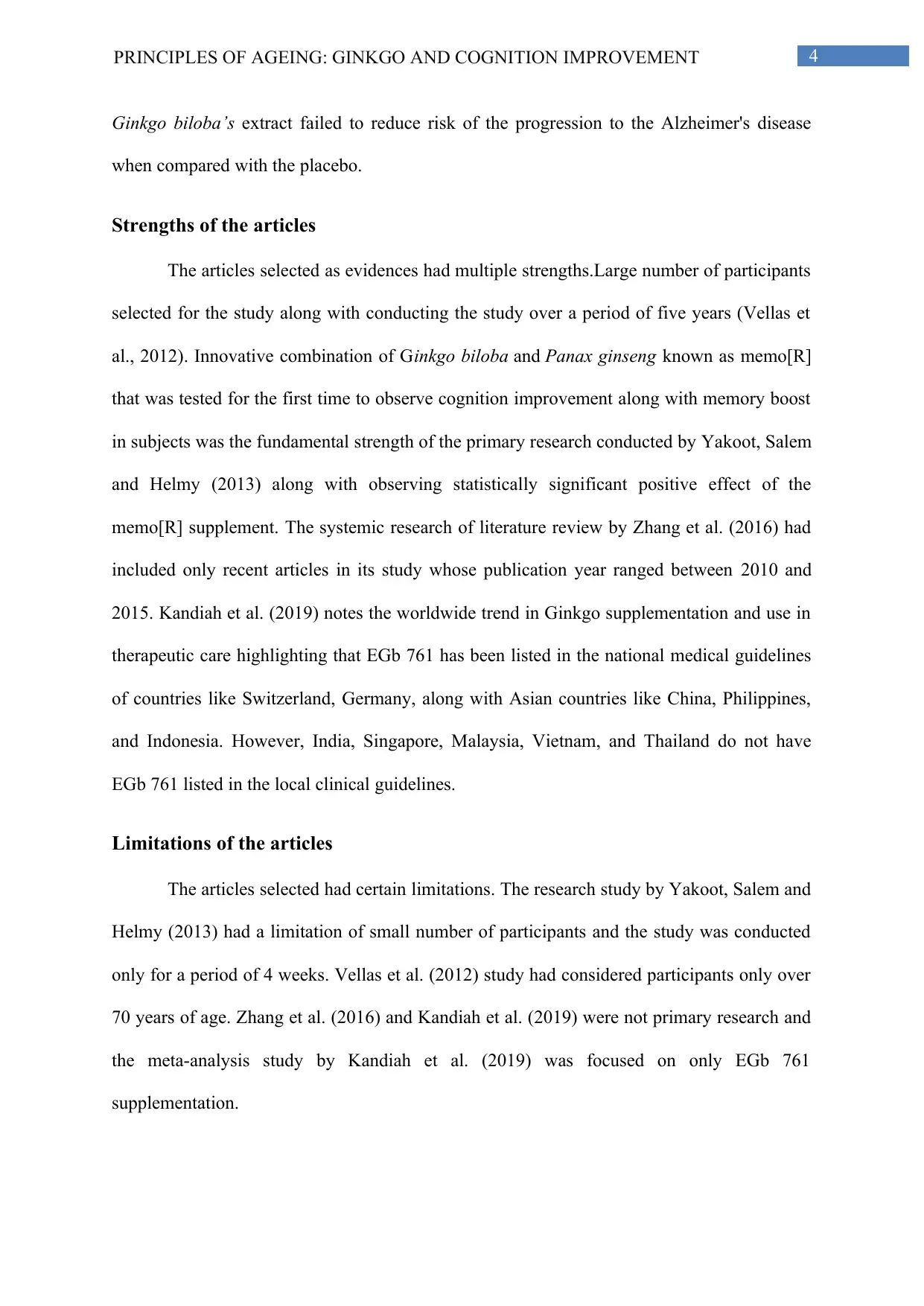
4PRINCIPLES OF AGEING: GINKGO AND COGNITION IMPROVEMENT
Ginkgo biloba’s extract failed to reduce risk of the progression to the Alzheimer's disease
when compared with the placebo.
Strengths of the articles
The articles selected as evidences had multiple strengths.Large number of participants
selected for the study along with conducting the study over a period of five years (Vellas et
al., 2012). Innovative combination of Ginkgo biloba and Panax ginseng known as memo[R]
that was tested for the first time to observe cognition improvement along with memory boost
in subjects was the fundamental strength of the primary research conducted by Yakoot, Salem
and Helmy (2013) along with observing statistically significant positive effect of the
memo[R] supplement. The systemic research of literature review by Zhang et al. (2016) had
included only recent articles in its study whose publication year ranged between 2010 and
2015. Kandiah et al. (2019) notes the worldwide trend in Ginkgo supplementation and use in
therapeutic care highlighting that EGb 761 has been listed in the national medical guidelines
of countries like Switzerland, Germany, along with Asian countries like China, Philippines,
and Indonesia. However, India, Singapore, Malaysia, Vietnam, and Thailand do not have
EGb 761 listed in the local clinical guidelines.
Limitations of the articles
The articles selected had certain limitations. The research study by Yakoot, Salem and
Helmy (2013) had a limitation of small number of participants and the study was conducted
only for a period of 4 weeks. Vellas et al. (2012) study had considered participants only over
70 years of age. Zhang et al. (2016) and Kandiah et al. (2019) were not primary research and
the meta-analysis study by Kandiah et al. (2019) was focused on only EGb 761
supplementation.
Ginkgo biloba’s extract failed to reduce risk of the progression to the Alzheimer's disease
when compared with the placebo.
Strengths of the articles
The articles selected as evidences had multiple strengths.Large number of participants
selected for the study along with conducting the study over a period of five years (Vellas et
al., 2012). Innovative combination of Ginkgo biloba and Panax ginseng known as memo[R]
that was tested for the first time to observe cognition improvement along with memory boost
in subjects was the fundamental strength of the primary research conducted by Yakoot, Salem
and Helmy (2013) along with observing statistically significant positive effect of the
memo[R] supplement. The systemic research of literature review by Zhang et al. (2016) had
included only recent articles in its study whose publication year ranged between 2010 and
2015. Kandiah et al. (2019) notes the worldwide trend in Ginkgo supplementation and use in
therapeutic care highlighting that EGb 761 has been listed in the national medical guidelines
of countries like Switzerland, Germany, along with Asian countries like China, Philippines,
and Indonesia. However, India, Singapore, Malaysia, Vietnam, and Thailand do not have
EGb 761 listed in the local clinical guidelines.
Limitations of the articles
The articles selected had certain limitations. The research study by Yakoot, Salem and
Helmy (2013) had a limitation of small number of participants and the study was conducted
only for a period of 4 weeks. Vellas et al. (2012) study had considered participants only over
70 years of age. Zhang et al. (2016) and Kandiah et al. (2019) were not primary research and
the meta-analysis study by Kandiah et al. (2019) was focused on only EGb 761
supplementation.
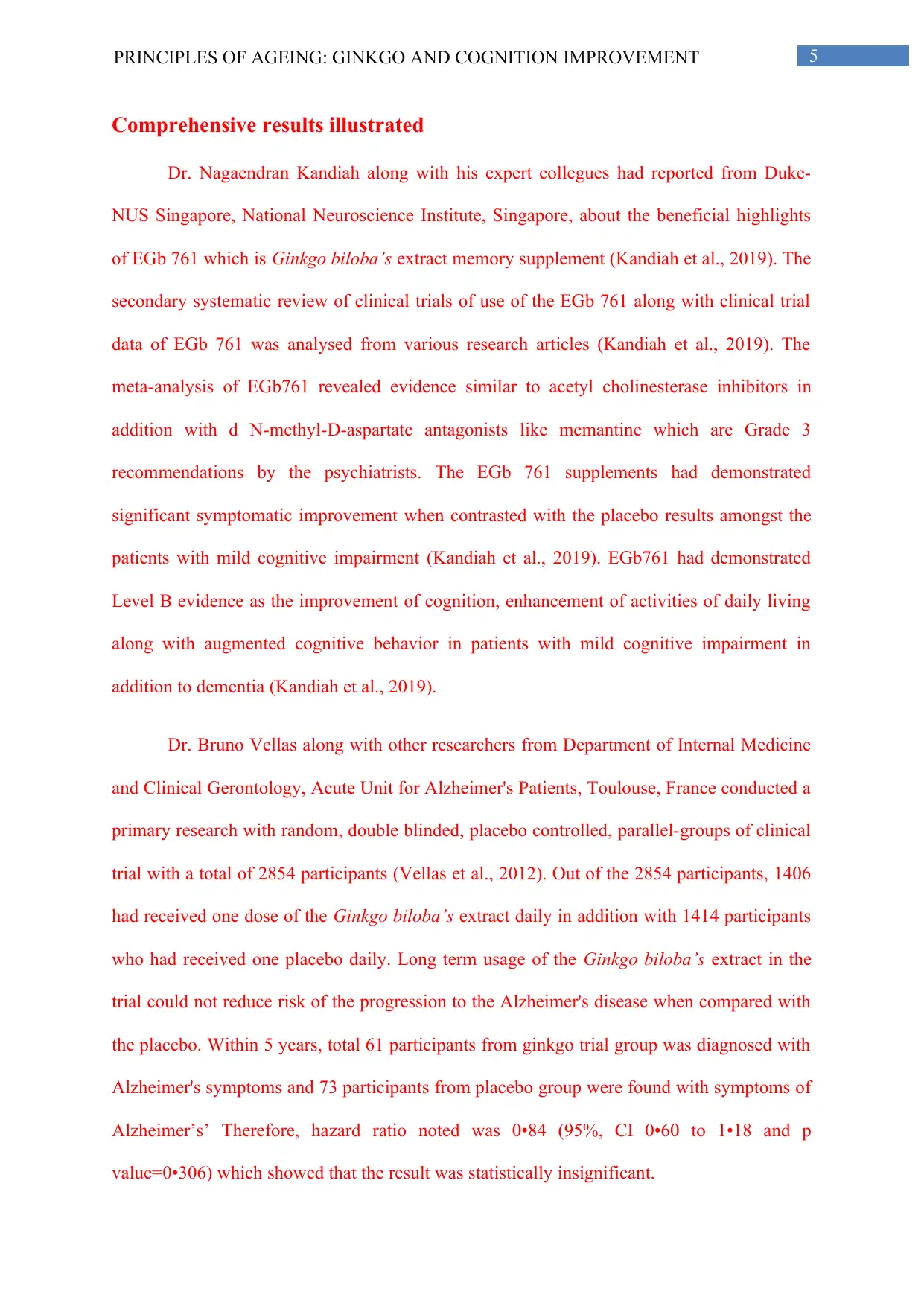
5PRINCIPLES OF AGEING: GINKGO AND COGNITION IMPROVEMENT
Comprehensive results illustrated
Dr. Nagaendran Kandiah along with his expert collegues had reported from Duke-
NUS Singapore, National Neuroscience Institute, Singapore, about the beneficial highlights
of EGb 761 which is Ginkgo biloba’s extract memory supplement (Kandiah et al., 2019). The
secondary systematic review of clinical trials of use of the EGb 761 along with clinical trial
data of EGb 761 was analysed from various research articles (Kandiah et al., 2019). The
meta-analysis of EGb761 revealed evidence similar to acetyl cholinesterase inhibitors in
addition with d N-methyl-D-aspartate antagonists like memantine which are Grade 3
recommendations by the psychiatrists. The EGb 761 supplements had demonstrated
significant symptomatic improvement when contrasted with the placebo results amongst the
patients with mild cognitive impairment (Kandiah et al., 2019). EGb761 had demonstrated
Level B evidence as the improvement of cognition, enhancement of activities of daily living
along with augmented cognitive behavior in patients with mild cognitive impairment in
addition to dementia (Kandiah et al., 2019).
Dr. Bruno Vellas along with other researchers from Department of Internal Medicine
and Clinical Gerontology, Acute Unit for Alzheimer's Patients, Toulouse, France conducted a
primary research with random, double blinded, placebo controlled, parallel-groups of clinical
trial with a total of 2854 participants (Vellas et al., 2012). Out of the 2854 participants, 1406
had received one dose of the Ginkgo biloba’s extract daily in addition with 1414 participants
who had received one placebo daily. Long term usage of the Ginkgo biloba’s extract in the
trial could not reduce risk of the progression to the Alzheimer's disease when compared with
the placebo. Within 5 years, total 61 participants from ginkgo trial group was diagnosed with
Alzheimer's symptoms and 73 participants from placebo group were found with symptoms of
Alzheimer’s’ Therefore, hazard ratio noted was 0•84 (95%, CI 0•60 to 1•18 and p
value=0•306) which showed that the result was statistically insignificant.
Comprehensive results illustrated
Dr. Nagaendran Kandiah along with his expert collegues had reported from Duke-
NUS Singapore, National Neuroscience Institute, Singapore, about the beneficial highlights
of EGb 761 which is Ginkgo biloba’s extract memory supplement (Kandiah et al., 2019). The
secondary systematic review of clinical trials of use of the EGb 761 along with clinical trial
data of EGb 761 was analysed from various research articles (Kandiah et al., 2019). The
meta-analysis of EGb761 revealed evidence similar to acetyl cholinesterase inhibitors in
addition with d N-methyl-D-aspartate antagonists like memantine which are Grade 3
recommendations by the psychiatrists. The EGb 761 supplements had demonstrated
significant symptomatic improvement when contrasted with the placebo results amongst the
patients with mild cognitive impairment (Kandiah et al., 2019). EGb761 had demonstrated
Level B evidence as the improvement of cognition, enhancement of activities of daily living
along with augmented cognitive behavior in patients with mild cognitive impairment in
addition to dementia (Kandiah et al., 2019).
Dr. Bruno Vellas along with other researchers from Department of Internal Medicine
and Clinical Gerontology, Acute Unit for Alzheimer's Patients, Toulouse, France conducted a
primary research with random, double blinded, placebo controlled, parallel-groups of clinical
trial with a total of 2854 participants (Vellas et al., 2012). Out of the 2854 participants, 1406
had received one dose of the Ginkgo biloba’s extract daily in addition with 1414 participants
who had received one placebo daily. Long term usage of the Ginkgo biloba’s extract in the
trial could not reduce risk of the progression to the Alzheimer's disease when compared with
the placebo. Within 5 years, total 61 participants from ginkgo trial group was diagnosed with
Alzheimer's symptoms and 73 participants from placebo group were found with symptoms of
Alzheimer’s’ Therefore, hazard ratio noted was 0•84 (95%, CI 0•60 to 1•18 and p
value=0•306) which showed that the result was statistically insignificant.
⊘ This is a preview!⊘
Do you want full access?
Subscribe today to unlock all pages.

Trusted by 1+ million students worldwide
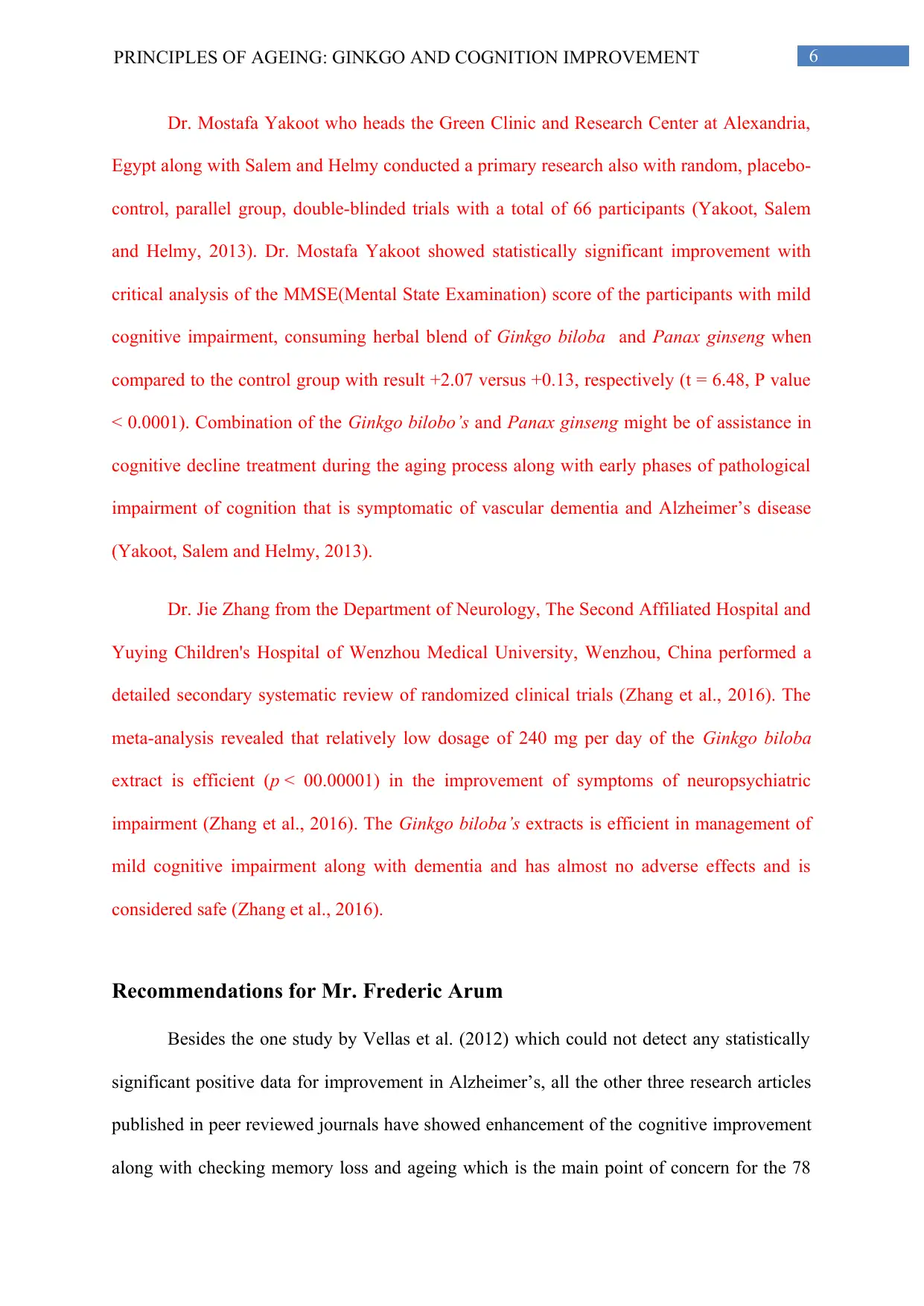
6PRINCIPLES OF AGEING: GINKGO AND COGNITION IMPROVEMENT
Dr. Mostafa Yakoot who heads the Green Clinic and Research Center at Alexandria,
Egypt along with Salem and Helmy conducted a primary research also with random, placebo-
control, parallel group, double-blinded trials with a total of 66 participants (Yakoot, Salem
and Helmy, 2013). Dr. Mostafa Yakoot showed statistically significant improvement with
critical analysis of the MMSE(Mental State Examination) score of the participants with mild
cognitive impairment, consuming herbal blend of Ginkgo biloba and Panax ginseng when
compared to the control group with result +2.07 versus +0.13, respectively (t = 6.48, P value
< 0.0001). Combination of the Ginkgo bilobo’s and Panax ginseng might be of assistance in
cognitive decline treatment during the aging process along with early phases of pathological
impairment of cognition that is symptomatic of vascular dementia and Alzheimer’s disease
(Yakoot, Salem and Helmy, 2013).
Dr. Jie Zhang from the Department of Neurology, The Second Affiliated Hospital and
Yuying Children's Hospital of Wenzhou Medical University, Wenzhou, China performed a
detailed secondary systematic review of randomized clinical trials (Zhang et al., 2016). The
meta-analysis revealed that relatively low dosage of 240 mg per day of the Ginkgo biloba
extract is efficient (p < 00.00001) in the improvement of symptoms of neuropsychiatric
impairment (Zhang et al., 2016). The Ginkgo biloba’s extracts is efficient in management of
mild cognitive impairment along with dementia and has almost no adverse effects and is
considered safe (Zhang et al., 2016).
Recommendations for Mr. Frederic Arum
Besides the one study by Vellas et al. (2012) which could not detect any statistically
significant positive data for improvement in Alzheimer’s, all the other three research articles
published in peer reviewed journals have showed enhancement of the cognitive improvement
along with checking memory loss and ageing which is the main point of concern for the 78
Dr. Mostafa Yakoot who heads the Green Clinic and Research Center at Alexandria,
Egypt along with Salem and Helmy conducted a primary research also with random, placebo-
control, parallel group, double-blinded trials with a total of 66 participants (Yakoot, Salem
and Helmy, 2013). Dr. Mostafa Yakoot showed statistically significant improvement with
critical analysis of the MMSE(Mental State Examination) score of the participants with mild
cognitive impairment, consuming herbal blend of Ginkgo biloba and Panax ginseng when
compared to the control group with result +2.07 versus +0.13, respectively (t = 6.48, P value
< 0.0001). Combination of the Ginkgo bilobo’s and Panax ginseng might be of assistance in
cognitive decline treatment during the aging process along with early phases of pathological
impairment of cognition that is symptomatic of vascular dementia and Alzheimer’s disease
(Yakoot, Salem and Helmy, 2013).
Dr. Jie Zhang from the Department of Neurology, The Second Affiliated Hospital and
Yuying Children's Hospital of Wenzhou Medical University, Wenzhou, China performed a
detailed secondary systematic review of randomized clinical trials (Zhang et al., 2016). The
meta-analysis revealed that relatively low dosage of 240 mg per day of the Ginkgo biloba
extract is efficient (p < 00.00001) in the improvement of symptoms of neuropsychiatric
impairment (Zhang et al., 2016). The Ginkgo biloba’s extracts is efficient in management of
mild cognitive impairment along with dementia and has almost no adverse effects and is
considered safe (Zhang et al., 2016).
Recommendations for Mr. Frederic Arum
Besides the one study by Vellas et al. (2012) which could not detect any statistically
significant positive data for improvement in Alzheimer’s, all the other three research articles
published in peer reviewed journals have showed enhancement of the cognitive improvement
along with checking memory loss and ageing which is the main point of concern for the 78
Paraphrase This Document
Need a fresh take? Get an instant paraphrase of this document with our AI Paraphraser
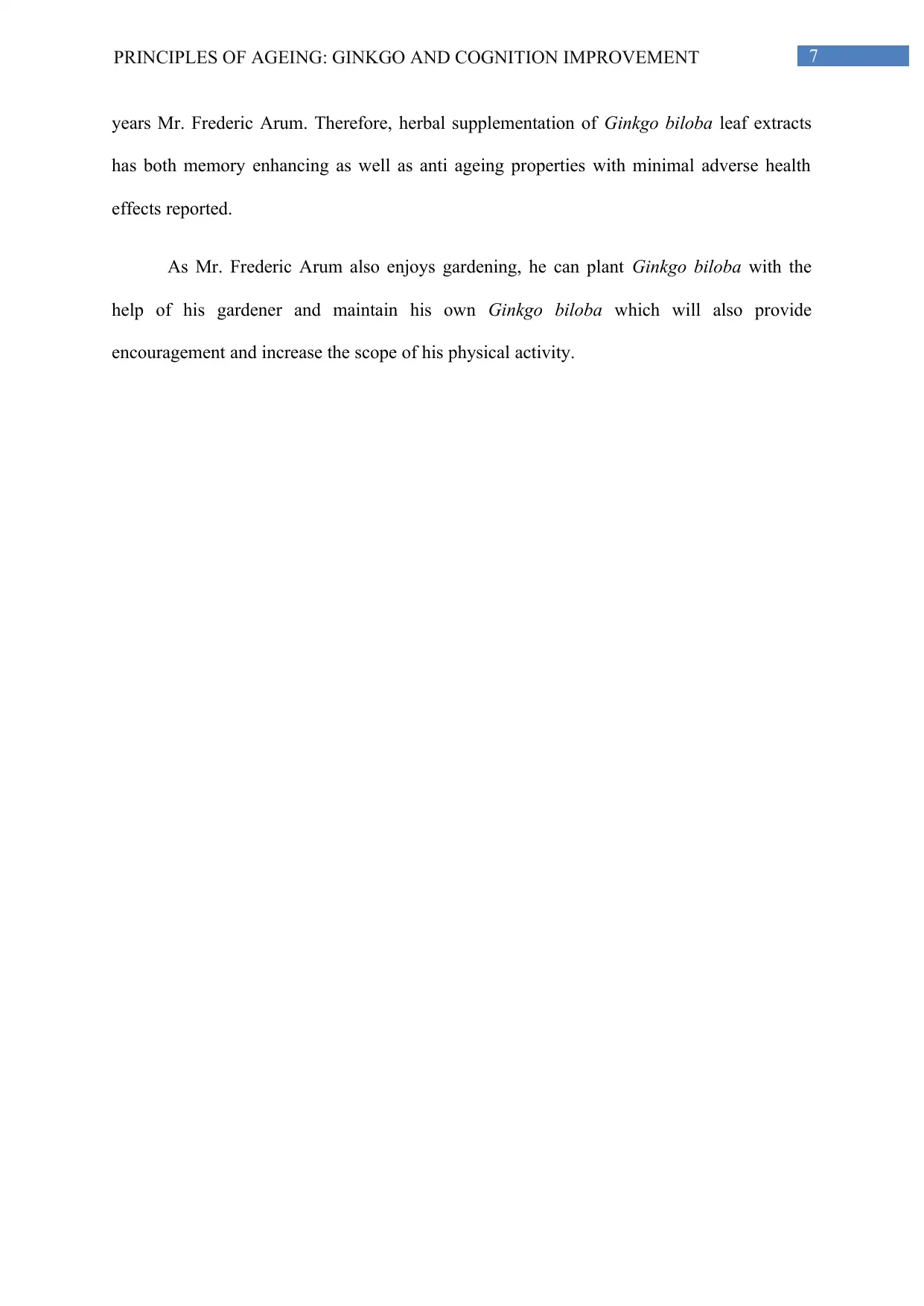
7PRINCIPLES OF AGEING: GINKGO AND COGNITION IMPROVEMENT
years Mr. Frederic Arum. Therefore, herbal supplementation of Ginkgo biloba leaf extracts
has both memory enhancing as well as anti ageing properties with minimal adverse health
effects reported.
As Mr. Frederic Arum also enjoys gardening, he can plant Ginkgo biloba with the
help of his gardener and maintain his own Ginkgo biloba which will also provide
encouragement and increase the scope of his physical activity.
years Mr. Frederic Arum. Therefore, herbal supplementation of Ginkgo biloba leaf extracts
has both memory enhancing as well as anti ageing properties with minimal adverse health
effects reported.
As Mr. Frederic Arum also enjoys gardening, he can plant Ginkgo biloba with the
help of his gardener and maintain his own Ginkgo biloba which will also provide
encouragement and increase the scope of his physical activity.
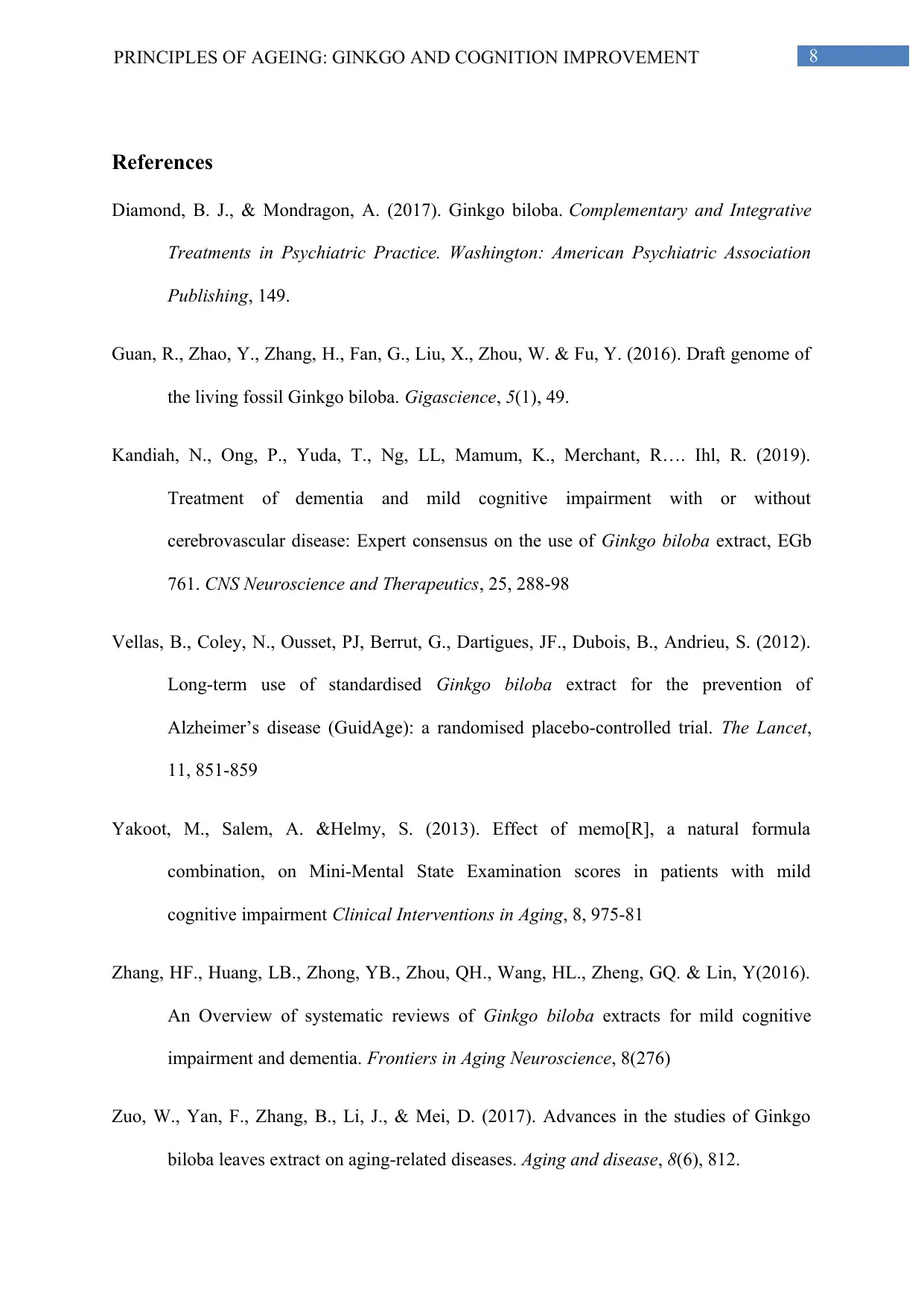
8PRINCIPLES OF AGEING: GINKGO AND COGNITION IMPROVEMENT
References
Diamond, B. J., & Mondragon, A. (2017). Ginkgo biloba. Complementary and Integrative
Treatments in Psychiatric Practice. Washington: American Psychiatric Association
Publishing, 149.
Guan, R., Zhao, Y., Zhang, H., Fan, G., Liu, X., Zhou, W. & Fu, Y. (2016). Draft genome of
the living fossil Ginkgo biloba. Gigascience, 5(1), 49.
Kandiah, N., Ong, P., Yuda, T., Ng, LL, Mamum, K., Merchant, R…. Ihl, R. (2019).
Treatment of dementia and mild cognitive impairment with or without
cerebrovascular disease: Expert consensus on the use of Ginkgo biloba extract, EGb
761. CNS Neuroscience and Therapeutics, 25, 288-98
Vellas, B., Coley, N., Ousset, PJ, Berrut, G., Dartigues, JF., Dubois, B., Andrieu, S. (2012).
Long-term use of standardised Ginkgo biloba extract for the prevention of
Alzheimer’s disease (GuidAge): a randomised placebo-controlled trial. The Lancet,
11, 851-859
Yakoot, M., Salem, A. &Helmy, S. (2013). Effect of memo[R], a natural formula
combination, on Mini-Mental State Examination scores in patients with mild
cognitive impairment Clinical Interventions in Aging, 8, 975-81
Zhang, HF., Huang, LB., Zhong, YB., Zhou, QH., Wang, HL., Zheng, GQ. & Lin, Y(2016).
An Overview of systematic reviews of Ginkgo biloba extracts for mild cognitive
impairment and dementia. Frontiers in Aging Neuroscience, 8(276)
Zuo, W., Yan, F., Zhang, B., Li, J., & Mei, D. (2017). Advances in the studies of Ginkgo
biloba leaves extract on aging-related diseases. Aging and disease, 8(6), 812.
References
Diamond, B. J., & Mondragon, A. (2017). Ginkgo biloba. Complementary and Integrative
Treatments in Psychiatric Practice. Washington: American Psychiatric Association
Publishing, 149.
Guan, R., Zhao, Y., Zhang, H., Fan, G., Liu, X., Zhou, W. & Fu, Y. (2016). Draft genome of
the living fossil Ginkgo biloba. Gigascience, 5(1), 49.
Kandiah, N., Ong, P., Yuda, T., Ng, LL, Mamum, K., Merchant, R…. Ihl, R. (2019).
Treatment of dementia and mild cognitive impairment with or without
cerebrovascular disease: Expert consensus on the use of Ginkgo biloba extract, EGb
761. CNS Neuroscience and Therapeutics, 25, 288-98
Vellas, B., Coley, N., Ousset, PJ, Berrut, G., Dartigues, JF., Dubois, B., Andrieu, S. (2012).
Long-term use of standardised Ginkgo biloba extract for the prevention of
Alzheimer’s disease (GuidAge): a randomised placebo-controlled trial. The Lancet,
11, 851-859
Yakoot, M., Salem, A. &Helmy, S. (2013). Effect of memo[R], a natural formula
combination, on Mini-Mental State Examination scores in patients with mild
cognitive impairment Clinical Interventions in Aging, 8, 975-81
Zhang, HF., Huang, LB., Zhong, YB., Zhou, QH., Wang, HL., Zheng, GQ. & Lin, Y(2016).
An Overview of systematic reviews of Ginkgo biloba extracts for mild cognitive
impairment and dementia. Frontiers in Aging Neuroscience, 8(276)
Zuo, W., Yan, F., Zhang, B., Li, J., & Mei, D. (2017). Advances in the studies of Ginkgo
biloba leaves extract on aging-related diseases. Aging and disease, 8(6), 812.
⊘ This is a preview!⊘
Do you want full access?
Subscribe today to unlock all pages.

Trusted by 1+ million students worldwide
1 out of 9
Your All-in-One AI-Powered Toolkit for Academic Success.
+13062052269
info@desklib.com
Available 24*7 on WhatsApp / Email
![[object Object]](/_next/static/media/star-bottom.7253800d.svg)
Unlock your academic potential
Copyright © 2020–2025 A2Z Services. All Rights Reserved. Developed and managed by ZUCOL.

